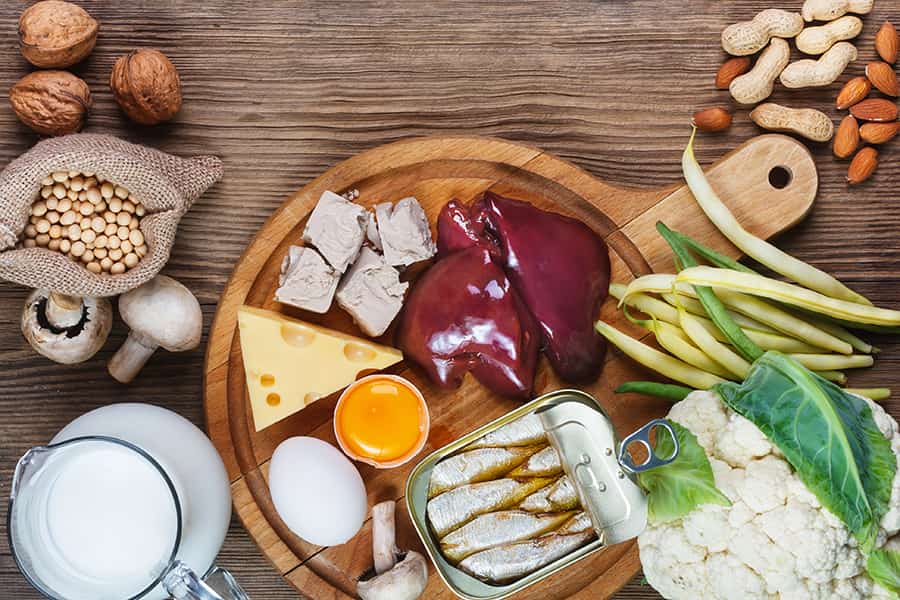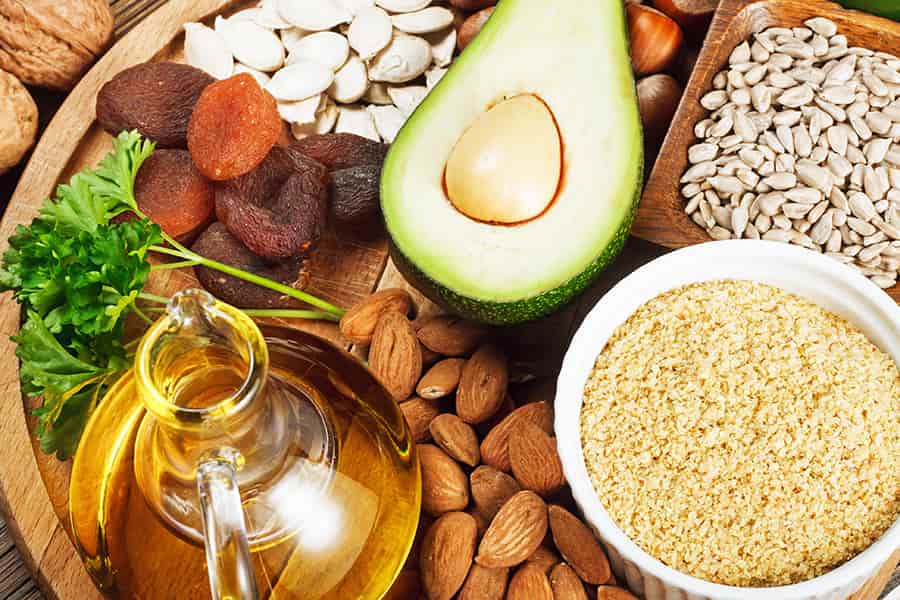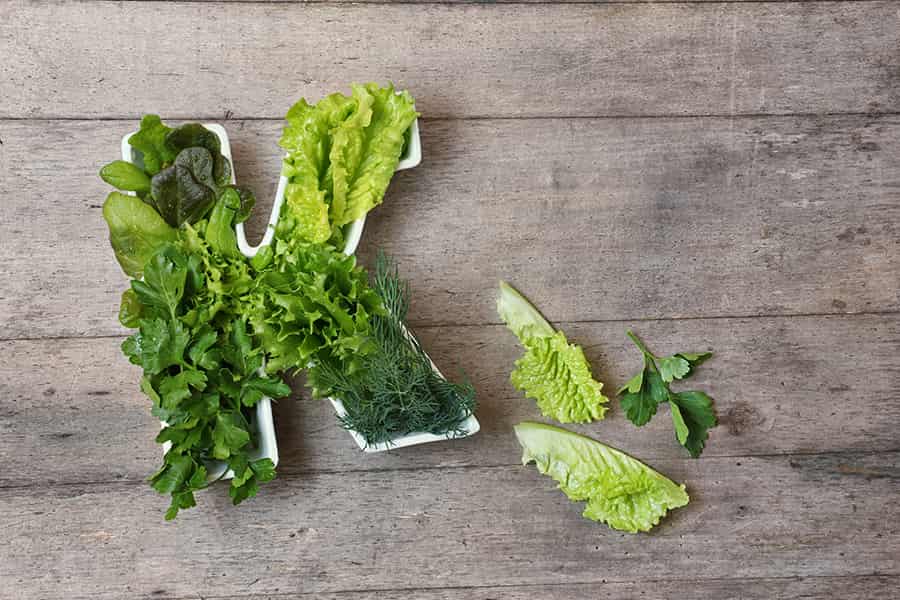- Home
- Health
- Healthy Body
- 12 essential vitamins that your body needs
Aside from key nutrients like carbohydrates, proteins, and fats, our bodies also need essential vitamins and minerals to stay healthy. Each of these vitamins play a different role in protecting our bodies and maintaining health – but what does each vitamin and mineral do? And what are the best dietary sources of these nutritional powerhouses?
Here are 12 essential vitamins and minerals that your body needs to stay healthy.
1. Vitamin A

Vitamin A plays a key role in the growth and development of cells. Also known as beta-carotene, it helps keep your heart, lungs, liver, and other organs working properly. It’s also known to promote healthy teeth, skin, hair, nails, and bones, and is important for reproductive and immune system health. Plus, it keeps your eyes healthy and helps to prevent night blindness.
Beta-carotene is an orangey-red pigment that’s found in fruit and vegetables, which our body then converts into vitamin A. Foods that are high in beta-carotene and vitamin A include carrots, sweet potato, cantaloupe melon, dark leafy greens, broccoli, butternut squash, peppers, apricots, and peas.
Our complete guide to vitamin A has plenty more information if you’d like to find out more.
2. Magnesium

Magnesium is an essential mineral that plays a key role in many of our body’s most important functions, including maintaining healthy muscle and nerve functions, heart rhythms, and glucose control.
It also acts as a natural muscle relaxant. Plus, because it helps convert vitamin D into calcium, it’s another mineral that’s vital for maintaining strong bones. Studies show that people who consume higher rates of magnesium each day have higher bone density.
Magnesium can be found in foods including spinach and other leafy greens, beans, potatoes, brown rice, oats, avocado, chicken, beef, broccoli, dark chocolate, as well as nuts like almonds, cashews, and peanuts.
Why not check out our article, Magnesium – what it is and why it’s important, to find out more?
3. Co-Q10

Coenzyme Q10 – also known as CoQ10 or Ubiquinol – is a compound that helps generate energy in our cells. It’s involved in making adenosine triphosphate (ATP): an organic compound that aids energy transfer between cells and serves as an antioxidant, protecting cells from damage, and helping to increase blood oxygenation.
Low levels of CoQ10 have been linked to conditions like heart disease, brain disorders, diabetes, and cancer. And though our bodies produce CoQ10 naturally, production usually decreases with age.
Luckily, we can get CoQ10 from foods including vegetables like spinach, cauliflower, and broccoli; fruits like oranges and strawberries; and legumes like soybeans, lentils, and peanuts. CoQ10 is also present in nuts and seeds like sesame seeds, walnuts, and pistachios; fatty fish like trout, herring, mackerel, and sardines; and organ meats like heart, liver, and kidney.
You can find out more about CoQ10 in our quick guide here.
4. Calcium

Calcium is the most important mineral for improving bone health, and roughly 99% of all the calcium in our body is found in our bones and teeth. If you don’t get enough calcium you’re more at risk of reduced bone density, premature bone loss, and an increased risk of fracture.
Smoking and drinking too much alcohol interferes with our body’s ability to absorb and regulate calcium, and conditions like Crohn’s disease and coeliac disease can also make it harder to absorb calcium.
You can get calcium from dairy products like milk, cheese, and yoghurt; fortified non-dairy milk like oat, almond, soy, and rice milk; dark green vegetables like collard greens, kale, and broccoli; as well as legumes, dried fruit, nuts, seeds, and tofu.
Because our body absorbs calcium better in smaller amounts, it’s best to spread your calcium intake throughout the day rather than eating a lot of calcium-right foods in one sitting.
To find out more about the importance of calcium and how much you need, have a read of our articles; Everything you need to know about calcium and 9 ways to improve bone health. You might also want to read our article on osteoporosis and Henrietta’s story about how she manages her symptoms.
5. B Vitamins

There are eight different essential B vitamins: B1, B2, B3, B5, B6, B7, B9, and B12.
- Vitamin B1 helps maintain a healthy metabolism, normal digestion, appetite, and nerve function.
- B2 promotes healthy adrenal function, supports vision, and helps maintain healthy skin.
- B3 helps metabolise energy and promote normal growth.
- B5 aids energy metabolism and stabilises blood sugar levels.
- B6 promotes protein and carbohydrate metabolism and healthy nerve function.
- B7 helps maintain a healthy metabolism.
- B9 makes DNA and red blood cells.
Most B vitamins can be found in whole unprocessed foods like whole grains, lentils, beans, nuts, seeds, potatoes, as well as fortified cereals, bread, and pasta.
However, vitamin B12 – which is vital for supporting the function of nerve cells, making red blood cells, DNA formation, and producing energy – is found mainly in animal products, like meat, fish, and eggs. If you follow a vegan diet, the good news is that many common plant-based foods are fortified with B12.
To find out more about the importance of B12, as well as how to ensure you’re getting enough in your diet, have a read of our article; A beginner’s guide to vitamin B12.
6. Vitamin E

Vitamin E is important for blood circulation and preventing blood clots, as well as strengthening our immune system. It also helps protect fatty acids and maintain muscles and red blood cells. Plus, vitamin E is a powerful antioxidant that – according to the National Institutes of Health – can protect our bodies from free radical damage and help slow the cell ageing process.
Some of the best sources of vitamin E are nuts like almonds, hazelnuts, and peanuts. Sunflower seeds, dark leafy greens like spinach and Swiss chard, avocados, butternut squash, tomatoes, mangoes, kiwi fruit, and wheatgerm oil also contain vitamin E, as do fortified grains and cereals.
You might want to check out our complete guide to vitamin E to find out more.
7. Iron

Iron is an essential mineral that your body needs to function properly. Iron plays a key role in building haemoglobin, a protein that’s found in red blood cells. Haemoglobin carries oxygen around the body and it makes up around two-thirds of all iron in our bodies.
If we don’t have enough iron, our bodies can’t get enough oxygen, and we’ll feel tired and lethargic. According to research, iron deficiency is the most common nutrient deficiency in the world, and this can develop into the more serious iron deficiency, anaemia.
Our bodies can’t produce iron, so we have to get it through our diet. There are two different types of dietary iron – heme and non-heme. Heme iron can be found in animal products like red meat and organ meat, eggs, and seafood including halibut, haddock, clams, oysters, and mussels.
On the other hand, non-heme iron is found in plants, like dried fruits, dark green leafy veg, nuts, seeds, chickpeas, beans, pulses, and fortified breakfast cereals. Because non-heme iron foods usually contain antioxidants, anti-inflammatories, and vitamins, these foods can also help boost our immune system.
To find out more about iron and the differences between heme and non-heme iron, have a read of our article, Iron: what it is, why it’s important & how to make sure you’re getting enough in your diet.
8. Vitamin C

Vitamin C plays a really important part in keeping our immune system healthy and helping us ward off harmful pathogens. Vitamin C is an antioxidant, which means it protects our cells from harmful free radicals. And because it encourages our bodies to produce collagen, it also promotes wound healing, increases iron absorption, and strengthens blood vessel walls.
Our bodies can’t produce vitamin C, so we have to get it from our diet. While citrus fruits like oranges are known for being high in vitamin C, other fruits and veggies like kiwis, cauliflower, broccoli, tomatoes, red and green peppers, strawberries, and brussels sprouts are also great sources of vitamin C.
To find out more about the role vitamin C plays in keeping us healthy, why not have a read of our articles; 10 ways to boost your immune system and Everything you need to know about vitamin C?
9. Vitamin K

Just like vitamin E, vitamin K is also important for blood clotting and helping wounds heal. If you’re vitamin K deficient, your body doesn’t have enough of the proteins that help blood clot, and one of the most common signs of vitamin K deficiency is excessive bleeding from wounds (even small ones). There’s also evidence that vitamin K can help keep bones healthy.
The best sources of vitamin K are leafy greens like kale, spinach, Brussels sprouts, and broccoli. Though it’s also found in soybeans, blueberries, figs, eggs, and vegetable oils.
You can find out more about vitamin K in our quick guide here.
10. Omega-3

Omega-3 fatty acids are among the most vital nutrients our body needs and have many important benefits. Few nutrients have been studied as extensively as omega-3, and research shows that they can…
- Prevent and treat depression and anxiety
- Enhance eye health
- Reduce risk factors for heart disease
- Help fight inflammation and autoimmune diseases
- Reduce liver fat
- Improve psychiatric disorders
- Protect the brain against age-related decline
- Boost bone health and help prevent cancer
The best sources of omega-3 fatty acids are oily fish like salmon, mackerel, sardines, anchovies, and herring, although you can also get omega-3 from cod liver oil, caviar, and oysters. Plant-based sources of omega-3 include flaxseeds, pumpkin seeds, chia seeds, and hemp seeds; nuts like walnuts, pecans, and hazelnuts; and soya bean products like tofu, tempeh, soya milk, and soya protein.
To find out more about omega-3 and make sure you’re getting enough, check out our article; Omega-3 – What is it and why do we need it?
11. Vitamin D

Known as the ‘sunshine vitamin’ (because our bodies produce it when our skin is exposed to sunlight), vitamin D has several vital functions. Because it helps our bodies absorb calcium from food and supplements, it can create stronger bones, teeth, and muscles.
It can also help boost our immune system, and may even be able to help protect against respiratory tract infections like Covid-19. It’s also believed that vitamin D affects serotonin levels, and can help boost our mood and reduce the risk of depression.
Vitamin D isn’t found naturally in many foods, and the best source of vitamin D is sunlight; however, in the UK the government recommends that we take 10mcg of vitamin D per day during the autumn and winter months when sunlight is harder to come by. You can also find vitamin D in foods like fortified juices, cereals, dairy, and plant milk, as well as oily fish, seafood, egg yolks, and mushrooms.
To find out more about vitamin D, have a read of our article; What is vitamin D and why do we need it to stay healthy?
12. Potassium

Potassium is another vital mineral that has many important functions like keeping your body hydrated, supporting healthy blood pressure, and aiding muscle contractions and nerve impulses. It’s also important in promoting healthy digestion and heart rhythm, as well as maintaining the body’s pH balance (acidity and alkalinity).
Our bodies don’t produce potassium naturally, so we have to get it through our diet – although many Western diets are low in potassium. Because getting too much potassium can cause health problems, potassium isn’t easily supplemented, but if you eat a healthy, balanced diet, you should be able to get enough natural sources of potassium each day.
Foods that are high in potassium include fruits like apricots, bananas, kiwis, oranges, and pineapples – as well as veggies like leafy greens, carrots, and potatoes. There are also high potassium levels in whole grains, beans, nuts, and lean meats.
Check out our article, Everything you need to know about potassium, for more information.
Final thoughts…
While there are many essential vitamins and minerals that we need to stay healthy, the good news is most of us are able to get enough from eating a healthy, balanced diet.
Though there are some health conditions that can make it harder to get enough of a certain nutrient, in many cases, you can supplement vitamins or minerals to make sure you’re getting enough.
However, if you feel you might be deficient in a certain nutrient and are thinking about taking a supplement, you should always speak to your GP first.
To find out more about the key vitamins and minerals our bodies need, as well as how to eat a healthy, balanced diet, why not head on over to the diet and nutrition section of our website?
Do you feel like you’re getting enough essential vitamins and minerals? Or do you have any additional tips for staying healthy? We’d be interested to hear from you in the comments below.
Selene Nelson is an author, freelance journalist, and lifestyle writer for Rest Less. After graduating from the University of Sussex with a degree in English Literature, Selene began contributing to many major newspapers and websites, and has written for the BBC, The Sunday Times, The Independent, Town & Country, and HuffPost. Her specialist subjects include food, travel, and health, though she enjoys writing about a wide range of topics (e.g. her two books are about veganism and psychopathy, respectively!). She enjoys cooking (particularly pasta and Asian noodle soups), reading, travelling, hiking, attempting to keep fit, and watching animal videos on YouTube.
* Links with an * by them are affiliate links which help Rest Less stay free to use as they can result in a payment or benefit to us. You can read more on how we make money here.

What if your knee or hip stopped giving you jip?
Choose Wellsoon self-pay surgery from Practice Plus Group with prices lower than you think, with no hidden costs. Get surgery in 4-6 weeks from meeting your consultant, with a range of specialist surgeries including hip and knee. Flexible finance options are available.
